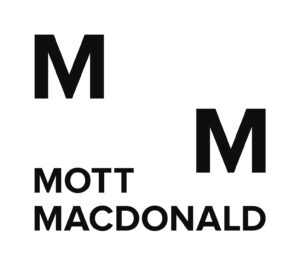

A UK-US collaboration
The United Kingdom’s Department for Business and Trade (DBT) and the Building Innovation Hub (the Hub) organized “Green Buildings: An Innovative Path to NetZero through Building Safety, Diversity and Digital Construction” on May 24, 2023 at the British Embassy in Washington.
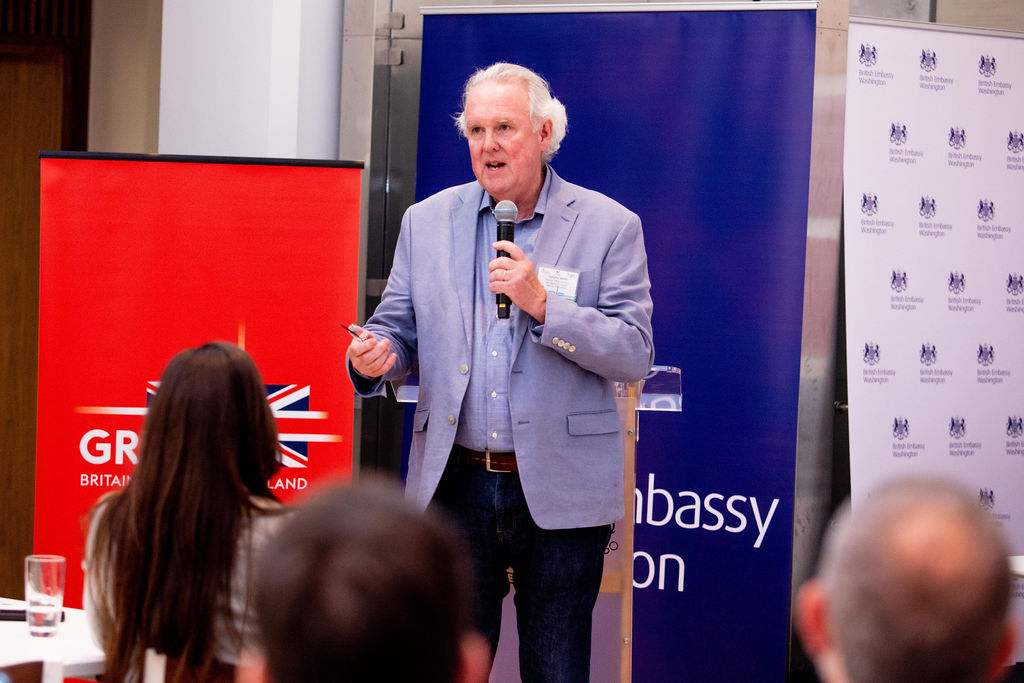
Tommy Wells speaking with the panelist at the British Embassy. Photo Credit: Mariah Miranda.
About the event
The evening’s events included expert knowledge-sharing and networking opportunities with sustainable building professionals and businesses in the commercial real estate industry, local and federal governments, international delegations, and students and guests from our local community. International and local experts discussed challenges and solutions to equitable, safe, zero-carbon buildings that contribute to the resiliency of our communities. Businesses, building industry trainees, and industry stakeholders connected on opportunities in the local and international building sector.
The programming started with welcome remarks by UK DBT US Country Director Rachael Bishop, followed by remarks by DDOT Director Everett Long on the equitable procurement practices envisioned in the Equity in Infrastructure Project (EIP) base on the Biden Administration’s commitment to Justice40 initiatives. Tommy Wells, OPLA Director, shared his thoughts on the urgency of action towards green buildings and infrastructure and moderated a panel of UK and US experts called “High-Performing Buildings – the moral imperatives of Building Safety, Diversity and Innovation in the Race to NetZero”. Following the panel, attendees broke off into small working groups and networking clusters inspired by the panel conversation. The event was captured by a live illustration by Lucinda Levine of Inkquiry Visuals and exhibitions spaces featured technology exhibits from UK mini-trade mission companies DTSA (Digital Twin Skills Academy), a consortium of companies led by Aerem Group, and engineering and development consultancy firm Mott MacDonald. The UK-US partnership was highlighted in fun activities and networking. Attendees walked away with connections and suggestions for how to take courageous climate action within our communities, our work, our cities, and our nations to achieve safer, more equitable, zero-carbon buildings that improve lives.
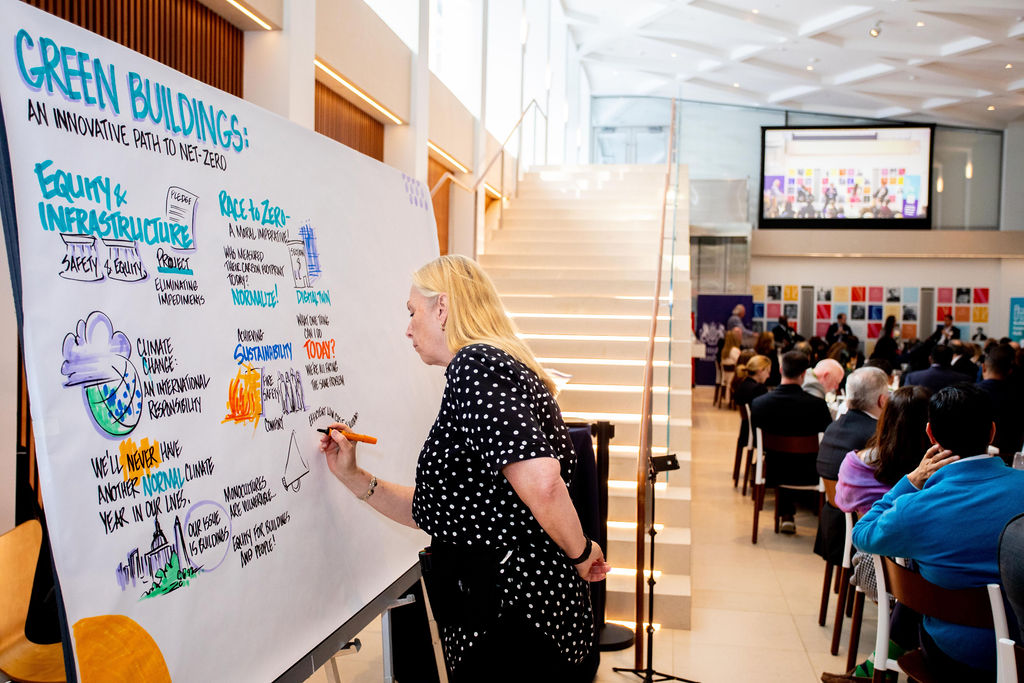
Illustration Credit: Lucinda Levine
Top three takeaways
1. Good leadership is critical.
The path to NetZero requires ambitious yet practical leaders. A theme that emerged from the panel was that goals must be achievable to ensure progress is made, but targets must be ambitious to ensure progress is effective.
As moderator Tommy Wells noted, “people under the age of 35 will not experience a ‘normal’ climate in their lifetime” underscoring the need for action. Bola Abisogun OBE emphasized the urgency for ambitious action, saying it is “time to stop playing small”. Cory Dippold pushed for regenerative solutions and resiliency as a step beyond the “do less bad” approach that can be tied to the term sustainability. Rory Moss outlined the idea of using the right materials that have longevity and durability to ensure both good returns and positive climate action, saying “if you invest in it from a durability and resiliency perspective the asset will last, require less carbon to run, and be more equitable.” Nicole Nason spoke on behalf of top sponsor Aerem Group on energy systems integration and the use of innovative technology partners and delivery partners to deliver the solutions to market, removing barriers and excuses. Wells pointed to cities as a solution to a low-carbon way to live, and highlighted the work underway in Washington, DC as a “message to the nation [that] how we do it in DC is possible elsewhere.”
The theme of leadership was also prominent in small group discussions. Participants felt that leaders must invest in local building industry, such as technical assistance in DC and Maryland paying for energy audits, and other best practices including community investments tied to development projects. They must also work with residents and organizations experiencing climate change “first and worst” to co-create building solutions that benefit people who have historically been marginalized. Three key steps toward equitable decarbonization are training a skilled workforce, hiring contractors that pay livable wages, and publicly reporting on progress toward climate and social goals.
“Time to stop playing small.Bola Abisogun OBE
2. Solutions must be comprehensive.
To ensure equity and safety in the path to NetZero, long-term comprehensive solutions are critical and must be prioritized over short-term stand-alone fixes. Abisogun noted that “short term thinking is one way to do things, but then the long-term gains that we all want to achieve will be less successful. This is cultural. The long-term ambitions have to become so normal that the gap between design and build is overcome.”
To support comprehensive solutions, local and international industry needs the digitization and integration of buildings with energy management systems, internet of things, Digital Twins, and digital construction in order for us to achieve these goals at scale.
Moss referenced the tragic building fire at Grenfell Tower which gave rise to the UK’s Building Safety Act indicating that government has an obligation to set clear regulations and to provide adequate training and financial support to ensure building contractors are qualified and that projects prioritize the safety of workers and occupants.
Small group discussions explored how both incentives and regulations play a powerful role in encouraging critical investments in high performance buildings. There was some consensus that voluntary action will not achieve the scale needed to mitigate climate change and improve lives.
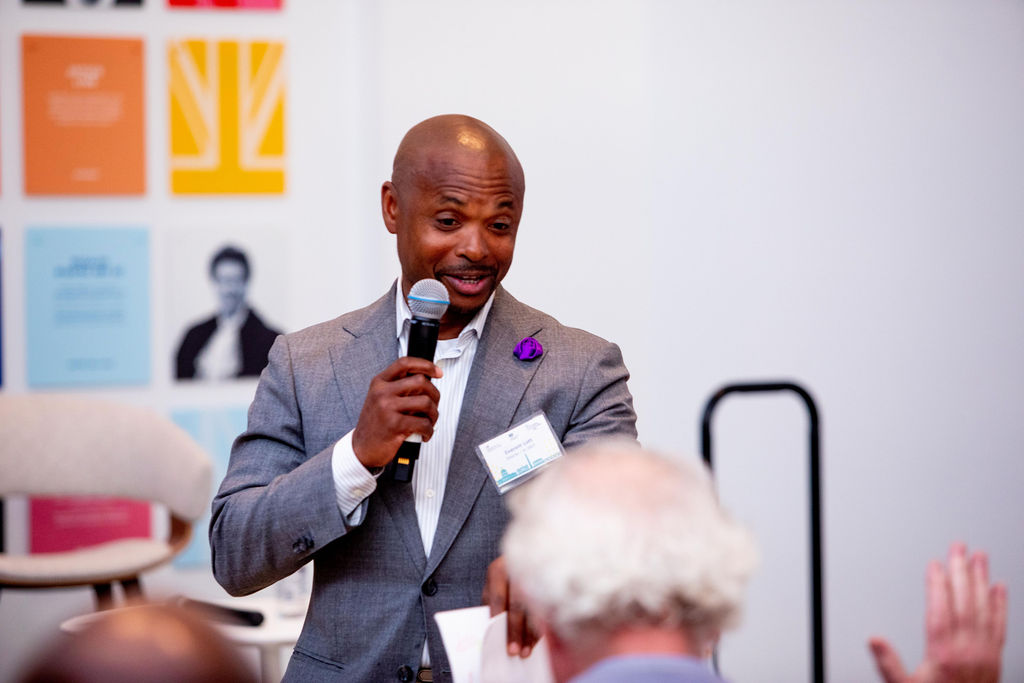
Everett Lott speaking on the EIP (Equity in Infrastructure Project). Photo Credit: Mariah Miranda.
3. Everyone has a role to play.
The path to NetZero depends on contributions from everyone in the building community, whether they are designers, contractors, owners, managers, regulators, occupants, or community members. As Nicole Nason put it: “What can we take away about what we can do TODAY.” Dippold pointed out that “engineers, architects, designers are uniquely positioned in the building industry and supply chain… we produce outputs (maps, models, reports) have a direct impact on building outcomes.” To take advantage of this, building teams must be able to plan effectively. They need information, resources, and support from jurisdictions to make decisions. They also need to take proactive action and prioritize energy efficiency, safety, and decarbonization.
Everyone must also keep human impact at the forefront of decision-making—and prioritize holistic solutions. Moss emphasized that everyone should expect to walk into a building and be safe, comfortable, no matter the weather or the situation, and be able to engage with others. Small group discussions highlighted the lack of affordable local worker housing. Many people in the buildings industry cannot afford to live close to the projects on which they work, indicating that the conversation on equitable building decarbonization needs to include affordable housing.
Using this event as a launchpad, the UK-US Building Innovation Working Group (BIWG), will continue to meet to discuss opportunities for innovation and impactful change to the climate effects on, and by, the built environment. With UK and US experts, the Hub, the DBT, and the District Department of Energy & Environment (DOEE), the BIWG members share a common goal of a NetZero future. Please reach out if you are interested in participating in this forward-thinking group of leaders!

Joe Tirone leading a business topic table discussion table for BABA (British American Business Association). Photo Credit: Mariah Miranda.
Further Learning
Additional resources to build on this event’s conversations about the path to NetZero:
- Hub’s Getting Started Resources
- Hub’s Find a Vendor Portal
- UK Digital Construction Guide
- UK Construction Industry Council (CIC) Diversity committee
- UK’s Building Safety Act
- Equity in Infrastructure Project (EIP)
- Digital Twins Skills Academy (DTSA)
- Hub Members
- DC Department of Energy and Environment (DOEE) website and Knowledgebase
- DC Department of Buildings (DOB) website
- DC Department of Small and Local Business Development (DSLBD) website
- DC Department of Transportation (DDOT) website

